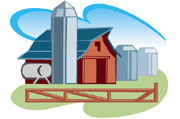Bulletin #2294, Maine Farm Safety Program: Front-End Loader Safety

Bulletin #2294, Maine Farm Safety Program: Front-End Loader Safety (PDF)
By Dawna L. Cyr, Farm Safety Project Assistant, and Steven B. Johnson, Ph.D., Extension Crops Specialist
For information about UMaine Extension programs and resources, visit extension.umaine.edu.
Find more of our publications and books at extension.umaine.edu/publications/.
Front-end loaders are versatile and can be a valuable tool for farm work. However, they change the center of gravity and the stability in the tractor-loader combination, so they can be dangerous if not operated properly. Changing the center of gravity presents a potential tipping hazard for the operator.
Before Working with a Loader
Read and follow the directions in the operator’s manual for the tractor. Only install loaders designed specifically for the tractor to reduce the chances of an accident with a front-end loader. Equip the loader with a roll-over protection structure and a seat belt for the best protection.
- Use a front-end loader only for its intended purpose.
- When traveling with a load, keep the bucket low.
- Watch for overhead clearance with the bucket raised.
Working with a Loader
Use a front-end loader only for its specific purpose. Never use it for such things as removing fence posts, towing or to knock something down. Never allow people to ride in the bucket. Never walk or work under a raised loader. Raise and lower the loader arms slowly and steadily. Never move or swing a load with people in the work area. If the tractor is to be used in tillage operations, remove the bucket first.
Load the bucket evenly, and avoid overloading to prevent upsets. Do not exceed the load limits listed in the operator’s manual. Keep the bucket low while carrying loads and operating on hills. A hole or sudden bump can easily upset the tractor if the bucket is carried and the rougher the terrain, the greater the danger of an upset.
Unsecured loads such as large, round bales carried without a bale fork or grapple can roll back and crush the operator. With loaded buckets, drive forward when going uphill. Back downhill with loads. Allow extra room to turn and maneuver because of the extension of the bucket.
Travel slowly with front-end loaders filled. Carry the load low, to maintain stability and visibility. However, make sure the load is high enough to avoid contact with the pavement. Be careful when turning with loads, especially those that may shift or slide. Add extra weight on the rear of the tractor to counter-balance the weight of the load of the front end loader. Check the operator’s manual for specific recommendations.
Keep the tractor wheels spread as widely as possible. Avoid using loaders on tricycle-type tractors, because the chances of a sideways upset will increase.
When operating a front-end loader, watch the road or field. Avoid holes, rocks, loose fill or any other obstacle that could upset the tractor. Watch for overhead wire and obstacles when the loader is raised. If working inside buildings, watch for low ceiling beams and doorways to prevent being pinned or crushed between them and the tractor. Also, be sure there is enough ventilation so carbon monoxide from the tractor engine will not build up.
Be very careful when backfilling. The weight of the fill material plus the weight of the tractor and loader could cause the new construction of collapse. Avoid undercutting high banks. Watch for falling rocks and cave-ins if a high bank must be undercut. Stay away from the outer edge when working along high banks and slopes.
Finishing Work and Servicing Loaders
When leaving the front-end loader, lower the bucket to the ground. This will keep children and others from accidentally lowering it and injuring someone.
When working on front-end loaders, take precautions. Have the loader safely blocked before working under it or through the loader arms. Work with the bucket down. Follow the manufacturer’s recommendations for routine maintenance.
This Maine Farm Safety fact sheet is part of an educational fact sheet series produced by University of Maine Cooperative Extension. For more information on farm safety, contact your UMaine Extension county office.
Information in this publication is provided purely for educational purposes. No responsibility is assumed for any problems associated with the use of products or services mentioned. No endorsement of products or companies is intended, nor is criticism of unnamed products or companies implied.
© 2002
Call 800.287.0274 (in Maine), or 207.581.3188, for information on publications and program offerings from University of Maine Cooperative Extension, or visit extension.umaine.edu.
In complying with the letter and spirit of applicable laws and pursuing its own goals of diversity, the University of Maine System does not discriminate on the grounds of race, color, religion, sex, sexual orientation, transgender status, gender, gender identity or expression, ethnicity, national origin, citizenship status, familial status, ancestry, age, disability physical or mental, genetic information, or veterans or military status in employment, education, and all other programs and activities. The University provides reasonable accommodations to qualified individuals with disabilities upon request. The following person has been designated to handle inquiries regarding non-discrimination policies: Director of Equal Opportunity and Title IX Services, 5713 Chadbourne Hall, Room 412, University of Maine, Orono, ME 04469-5713, 207.581.1226, TTY 711 (Maine Relay System).

